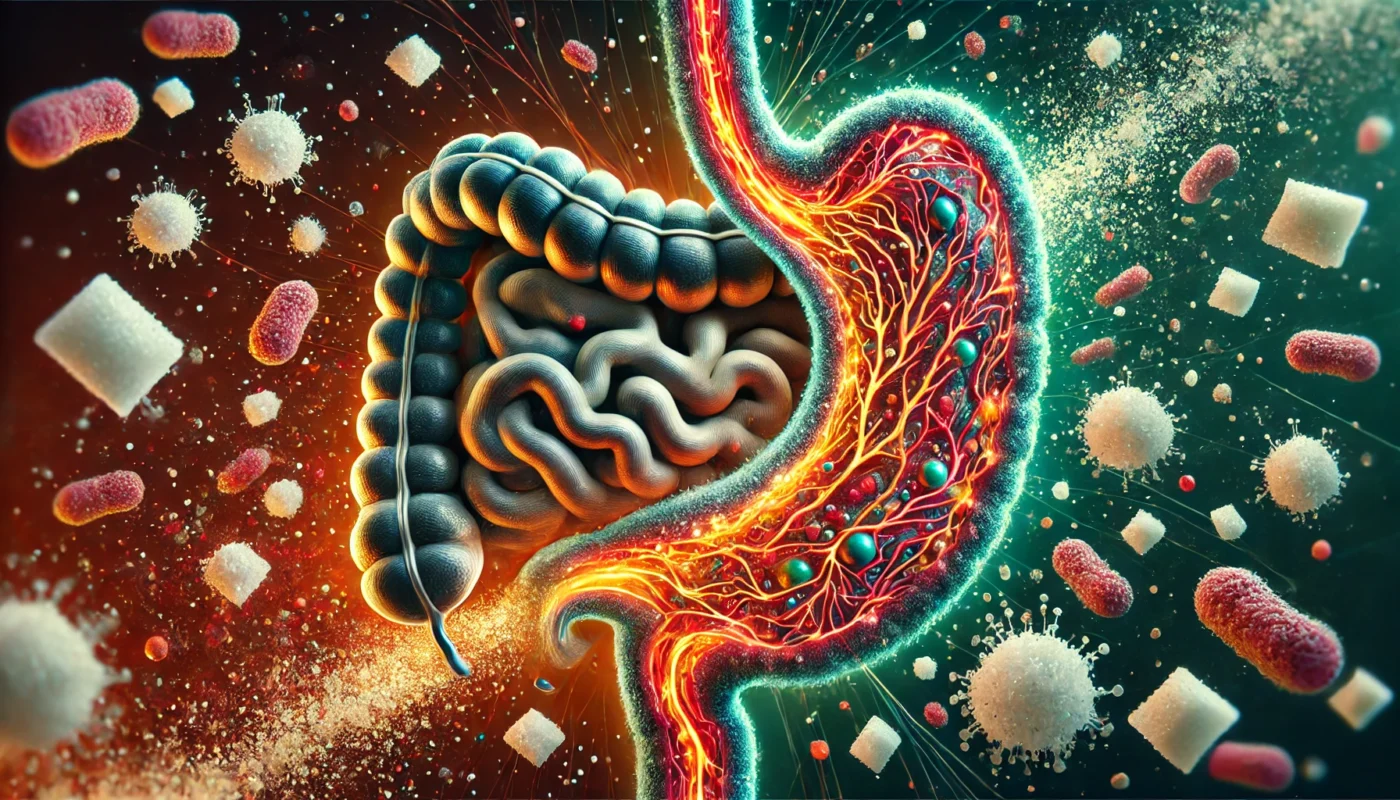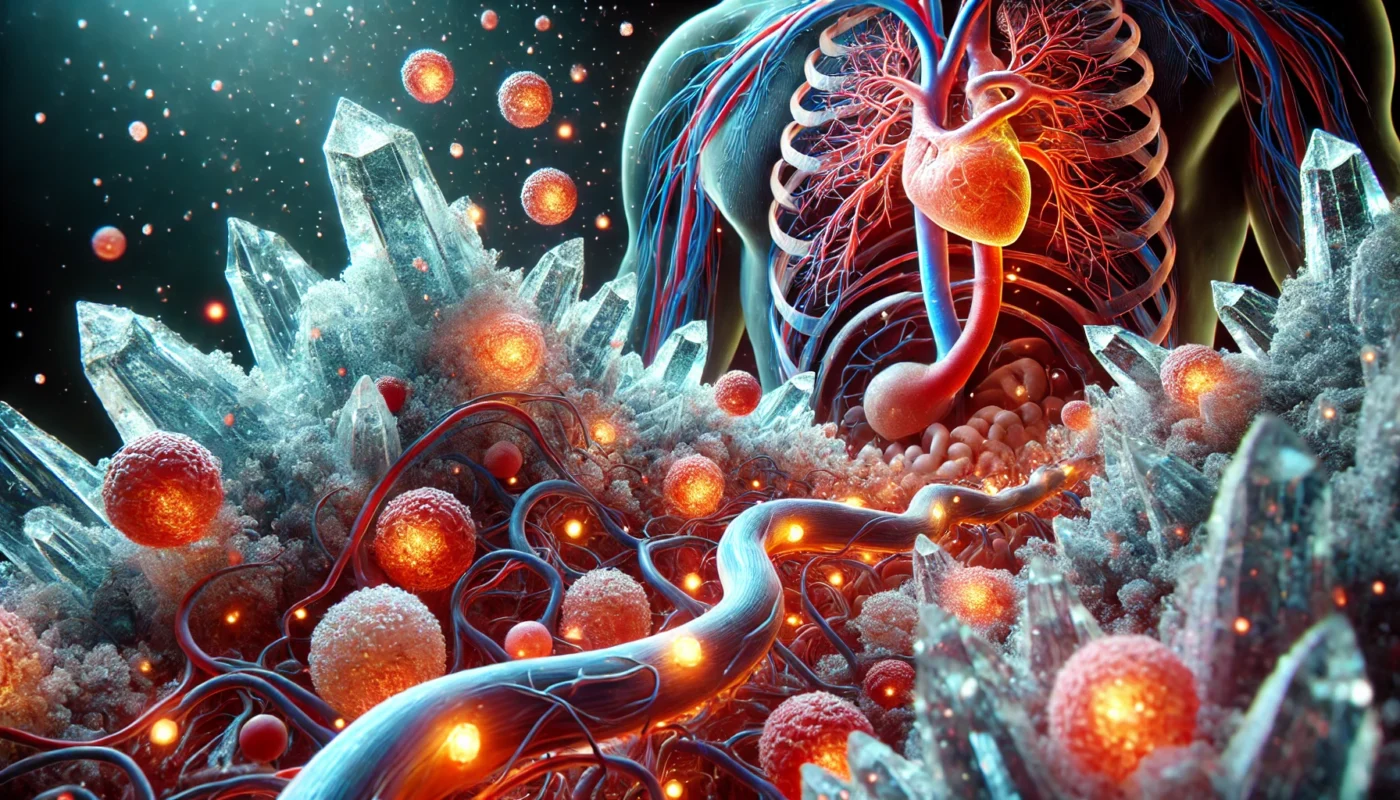Inflammation is a natural and essential part of the body’s immune response. It helps to fend off pathogens and repair tissue. However, when inflammation becomes chronic, it can contribute to a host of health issues, including arthritis, heart disease, and diabetes. Chronic inflammation is often described as a slow, silent burn that can lead to significant long-term damage.
You may also like: 20 Powerful Anti-Inflammatory Foods
Acute vs. Chronic Inflammation
Acute inflammation is the body’s immediate response to injury or infection. It is characterized by redness, heat, swelling, and pain. This type of inflammation is crucial for healing and resolves once the body has dealt with the threat. Chronic inflammation, on the other hand, persists over time and can occur without an apparent immediate cause. Unlike acute inflammation, it can quietly wreak havoc on the body and is linked to various chronic diseases.
Causes of Chronic Inflammation
Several factors can contribute to chronic inflammation, including poor diet, lack of exercise, stress, and exposure to environmental toxins. A diet high in processed foods, sugars, and unhealthy fats is a significant contributor. Additionally, lifestyle factors such as smoking, excessive alcohol consumption, and chronic stress can exacerbate inflammation. Understanding these triggers is essential for managing and reducing chronic inflammation.
Health Implications of Chronic Inflammation
The health implications of chronic inflammation are vast and can affect various systems in the body. It is a known risk factor for cardiovascular diseases, including heart attacks and strokes. Chronic inflammation is also linked to the development of insulin resistance, leading to type 2 diabetes. Moreover, it can contribute to the progression of neurodegenerative diseases like Alzheimer’s and is a key factor in autoimmune conditions such as rheumatoid arthritis and lupus.
The Role of Salt in the Body
Salt, primarily composed of sodium chloride, is crucial for maintaining fluid balance, nerve function, and muscle contractions. Yet, excessive sodium intake can have adverse effects, particularly on cardiovascular health. The question then arises: does this excess also contribute to inflammation?
Sodium and Fluid Balance
Sodium plays a vital role in regulating the body’s fluid balance. It helps maintain the right amount of fluid inside and outside of cells, which is essential for proper cell function. This balance is critical for blood pressure regulation, and any disruption can lead to either dehydration or edema, both of which have their own health consequences. Consuming the right amount of sodium is key to maintaining this delicate balance.
Sodium’s Role in Nerve Function
Nerve cells rely on sodium to transmit electrical signals throughout the body. This process is crucial for muscle contractions, heart function, and brain activity. Sodium channels in nerve cells open and close to allow the flow of ions, generating the electrical impulses necessary for communication between cells. Without adequate sodium, these processes can become impaired, leading to muscle weakness and neurological issues.
Muscle Contractions and Sodium
Sodium is essential for muscle contractions, including those of the heart. It works alongside potassium to generate the electrical charge needed for muscle fibers to contract. This balance ensures that muscles can contract and relax properly, supporting everything from basic movements to intense physical activity. An imbalance in sodium levels can lead to muscle cramps, spasms, and even more severe cardiac issues.
Can Salt Cause Inflammation?
Research into the relationship between salt and inflammation is ongoing, with studies suggesting a potential link. A study published in the journal Nature found that high-salt diets can exacerbate autoimmune diseases by promoting pro-inflammatory immune cell activity. Another study indicated that excessive sodium intake may alter the gut microbiome, leading to increased inflammatory responses.

Scientific Insights
The scientific community is actively exploring how salt intake affects inflammation at the cellular level. One area of interest is the role of salt in activating specific immune cells that promote inflammation. Studies have shown that a high-sodium diet can lead to an increase in TH17 cells, a type of immune cell linked to inflammatory diseases. Understanding this mechanism is crucial for developing dietary recommendations and interventions.
Gut Microbiome and Salt
The gut microbiome, a complex community of microorganisms in the digestive tract, plays a significant role in regulating inflammation. Emerging research suggests that high salt intake can disrupt this delicate balance, leading to an overgrowth of harmful bacteria that promote inflammation. This dysbiosis can contribute to a leaky gut, where harmful substances enter the bloodstream, triggering systemic inflammation.
Critically Evaluating Research
While current studies provide valuable insights into the salt-inflammation connection, it’s important to approach these findings with caution. Human physiology is complex, and various factors can influence the outcomes of dietary studies. More long-term, controlled research is needed to understand the causal relationships and to develop comprehensive guidelines for salt consumption and inflammation management.
Are Salty Foods Inflammatory?
Salty foods, often high in sodium, can be problematic if consumed in excess. Processed foods, which are typically laden with sodium, can lead to an imbalance in the body’s sodium levels, potentially triggering inflammation. This is particularly concerning given the prevalence of processed foods in modern diets.
Processed Foods and Sodium Content
Processed foods are a major source of dietary sodium, often containing far more than homemade meals. From canned soups and frozen dinners to snacks and fast food, these items can contribute significantly to daily sodium intake. The convenience of processed foods makes them a staple in many diets, but their high sodium content poses a risk for those prone to inflammation.
Hidden Sodium in Everyday Foods
Many foods contain hidden sodium that can easily add up throughout the day. Items like bread, cheese, and sauces may not taste salty but can still contribute to high sodium intake. Being aware of these hidden sources is essential for those trying to manage their sodium consumption and reduce inflammation risk.
The Modern Diet and Inflammation
The modern diet, characterized by high intake of processed foods, sugars, and unhealthy fats, is a significant driver of chronic inflammation. This dietary pattern not only increases sodium intake but also introduces other pro-inflammatory compounds. Transitioning to a diet rich in whole, unprocessed foods can help counteract these effects and promote better health.
Practical Strategies for Reducing Sodium Intake
Reducing sodium intake can be a valuable strategy for mitigating inflammation and improving overall health. Here are some practical tips:
Opt for Fresh, Whole Foods
Focus on consuming fresh fruits, vegetables, lean proteins, and whole grains, which are naturally low in sodium. These foods provide essential nutrients that support health and help reduce inflammation. Incorporating a variety of colors and types of produce ensures a wide range of antioxidants and anti-inflammatory compounds.

Read Labels Carefully
Processed foods can be deceivingly high in sodium. Always check nutrition labels and choose low-sodium options when available. Understanding food labels can empower consumers to make healthier choices and avoid excessive sodium intake. Look for products with sodium content below 5% of the daily value per serving.
Season with Herbs and Spices
Enhance the flavor of your dishes with herbs, spices, and citrus instead of relying solely on salt. These alternatives can add depth and complexity to meals without increasing sodium levels. Experimenting with different combinations can lead to delicious, health-promoting meals.
Be Mindful of Restaurant Meals
Restaurant meals can be particularly high in sodium. Consider requesting meals with no added salt or choosing dishes with fresh ingredients. Being proactive about sodium content when dining out can significantly reduce intake and help manage inflammation.
Plan and Prepare Meals at Home
Preparing meals at home allows for complete control over sodium content and ingredient quality. Batch cooking and meal prepping can make this process more manageable, ensuring healthy, low-sodium options are readily available throughout the week.
Holistic Approaches to Managing Inflammation
In addition to dietary modifications, several holistic approaches can help manage inflammation:
Mindfulness and Stress Reduction
Chronic stress can exacerbate inflammation. Practices such as meditation, yoga, and deep breathing can help reduce stress levels and consequently lower inflammation. These practices promote a state of relaxation, reducing the production of stress hormones that can trigger inflammatory responses.
Regular Physical Activity
Engaging in regular physical activity promotes overall health and can help reduce inflammation. Aim for a balance of cardiovascular, strength, and flexibility exercises. Exercise stimulates the production of anti-inflammatory cytokines and helps maintain a healthy weight, reducing the burden of inflammation.
Adequate Sleep
Quality sleep is essential for the body’s repair processes. Aim for 7-9 hours of restful sleep per night to support immune function and reduce inflammation. Establishing a regular sleep routine and creating a relaxing bedtime environment can enhance sleep quality and promote healing.
Social Connections and Support
Strong social connections can positively impact stress levels and inflammation. Engaging with a supportive community, whether through family, friends, or social groups, can provide emotional support and reduce feelings of isolation, contributing to lower inflammation levels.
Mind-Body Therapies
Incorporating mind-body therapies, such as tai chi or acupuncture, can complement traditional approaches to managing inflammation. These practices focus on balancing the body’s energy and promoting relaxation, offering additional benefits for reducing stress and inflammation.

Conclusion
While the link between salt and inflammation is complex and still under investigation, it is clear that excessive sodium intake can contribute to health issues. By adopting a balanced approach that includes a diet rich in whole foods, mindful sodium consumption, and holistic lifestyle practices, individuals can take proactive steps to manage inflammation and enhance their overall wellbeing.
In the journey toward optimal health, understanding the nuances of how dietary choices like salt intake impact our bodies is crucial. As research continues to evolve, staying informed and making conscious, informed decisions will empower you to lead a healthier, more balanced life. Embracing these strategies can help mitigate the effects of inflammation and support long-term health and vitality.
Further Reading:
Why Too Much Salt Can Be Bad for You
Dietary Sodium, Adiposity, and Inflammation in Healthy Adolescents
Scientists explore if a little less sodium in the diet translates to less inflammation, oxidatative
salt, inflammation, chronic inflammation, health, diet, sodium, autoimmune diseases, gut microbiome, processed foods, nutrition, wellness, holistic health, lifestyle, inflammation management, healthy eating
Important Note: The information contained in this article is for general informational purposes only, and should not be construed as health or medical advice, nor is it intended to diagnose, prevent, treat, or cure any disease or health condition. Before embarking on any diet, fitness regimen, or program of nutritional supplementation, it is advisable to consult your healthcare professional in order to determine its safety and probable efficacy in terms of your individual state of health.
Regarding Nutritional Supplements Or Other Non-Prescription Health Products: If any nutritional supplements or other non-prescription health products are mentioned in the foregoing article, any claims or statements made about them have not been evaluated by the U.S. Food and Drug Administration, and such nutritional supplements or other health products are not intended to diagnose, treat, cure, or prevent any disease

